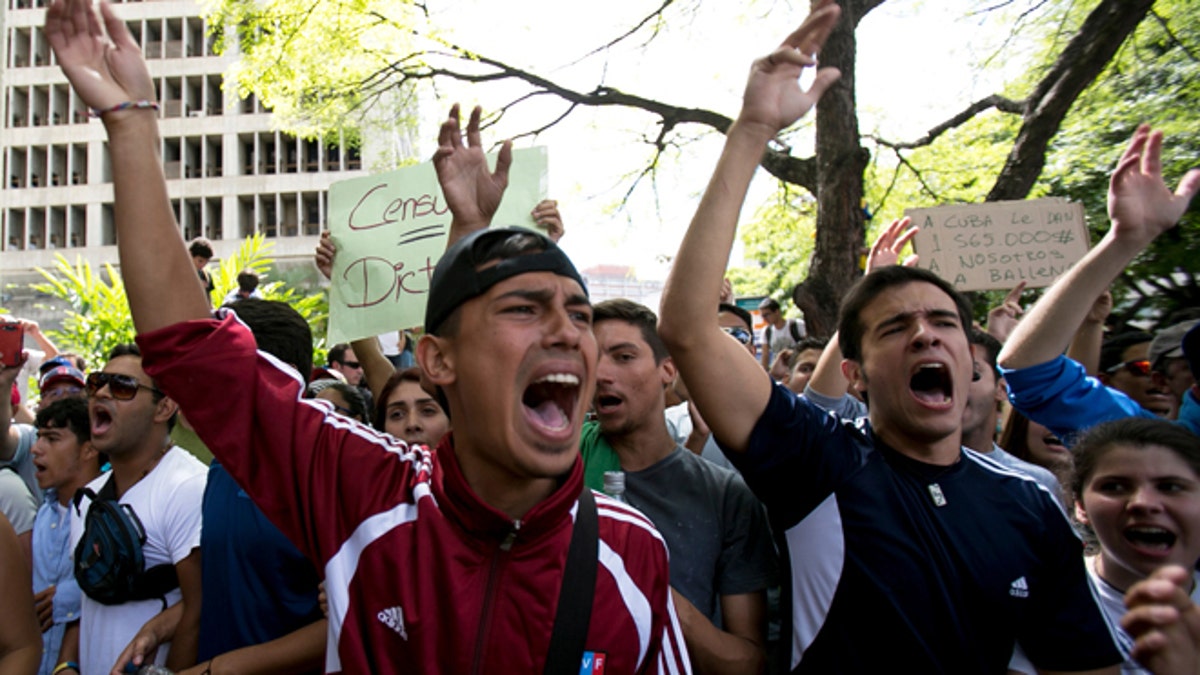
Feb. 17, 2014: Students shout slogans against Venezuela's President Nicolas Maduro during a march to Venezuelan Telecommunications Regulator Office or CONATEL in Caracas, Venezuela. (AP)
CARACAS, Venezuela – Opposition leader Leopoldo Lopez was arrested Tuesday after emerging from days of hiding and making an impassioned speech to thousands of supporters, saying he hoped his detention will open Venezuelans' eyes to the increasingly authoritarian bent of their government.
Speaking with a megaphone to more than 5,000 people, Lopez said that he doesn't fear going to jail to defend his beliefs and constitutional right to peacefully protest against President Nicolas Maduro.
"We've got nothing to hide," Lopez told a sea of supporters who, like him, were dressed in white to symbolize non-violence. He said it is worth going to jail if it "awakens Venezuela" to the "corrupt" justice and economic "disaster" left by 15 years of socialist rule.
After the short speech, Lopez descended from a statue of 19th century Cuban independence hero Jose Marti, and clutching a flower stem, walked a few feet to a police picket, where he turned himself in.
Opposition politicians urged calm as Lopez was taken away by police in an armored vehicle, and frustration rose as a heavily armed police picket blocked supporters from marching downtown as they had originally planned.
Lopez was being sought by authorities on an arrest order for allegedly inciting violence that broke out during protests last week in which three people were killed. He faces charges including homicide and vandalism of public property. Maduro accuses Lopez of leading a "fascist" plot to overthrow him.
Hours later, Maduro addressed a rival crowd of red-shirted oil workers, and said he personally oversaw security forces to make sure the opposition march and Lopez's surrender didn't result in violence.
Lashing out at critics, Maduro told the cheering crowd that he won't tolerate "psychological warfare" perpetrated by his opponents. Lopez must answer for his "treasonous" acts, he said.
"Nobody has the right to subject families to street violence by small, armed and hooded groups that today, the 18th of February, wanted to overthrow the government," said Maduro. "In Venezuela everyone has full political freedoms."
The rallies came one day after Maduro's government gave three U.S. Embassy officials 48 hours to leave the country, claiming they were supporting opposition plots to topple his 10-month-old administration. The U.S. has denied that.
The Venezuelan government accuses the Obama administration of siding with student protesters it has blamed for the violence and stirring up unrest to regain dominance over South America's largest oil producer.
In Washington, the State Department on Tuesday said allegations that the U.S. is helping to organize protests are "baseless and false" and hinted that it will soon take retaliatory action for the diplomats' expulsion.
Spokeswoman Jen Psaki said that Venezuela was trying "to distract from its own actions by blaming the United States," adding, "These efforts reflect a lack of seriousness on the part of the Venezuelan government to deal with the grave situation it faces."
Foreign Minister Elias Jaua said Monday that the three senior U.S. consular officers are being expelled because they tried to infiltrate Venezuelan universities under the cover of doing visa outreach. Maduro has expelled American diplomats twice before.
Hundreds of students have spent the past week in the streets of Caracas alternating between peaceful protests by day and pitched battles with police at night in unrest fed by hardships that include rampant crime, 56 percent inflation and shortages of basic goods.
Three people were killed in clashes Wednesday -- two students and a government supporter. News videos and photographs taken at the time indicate at least one of the students was killed when pro-government militia members fired directly into a crowd of protesters.
On Monday, a fourth victim, a 17-year-old boy, was killed when an unidentified vehicle accelerated into a group of student protesters in the state of Sucre.
Evelyn Montes, a 30-year-old medical student, said that the arrest of Lopez will make plain to many Venezuelans and the world what she considers Maduro's authoritarian bent.
"People are scared," said Montes as a group of several protesters began to gather in eastern Caracas Tuesday. "This will open their eyes."








































